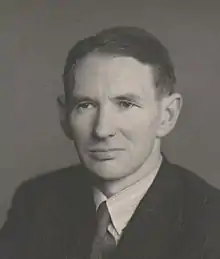Douglas Jay
Douglas Patrick Thomas Jay, Baron Jay, PC (23 March 1907 – 6 March 1996) was a British Labour Party politician.
The Lord Jay | |
|---|---|
 | |
| President of the Board of Trade | |
| In office 18 October 1964 – 29 August 1967 | |
| Prime Minister | Harold Wilson |
| Preceded by | Edward Heath |
| Succeeded by | Anthony Crosland |
| Financial Secretary to the Treasury | |
| In office 23 February 1950 – 30 October 1951 | |
| Prime Minister | Clement Attlee |
| Preceded by | Glenvil Hall |
| Succeeded by | John Boyd-Carpenter |
| Economic Secretary to the Treasury | |
| In office 13 November 1947 – 23 February 1950 | |
| Prime Minister | Clement Attlee |
| Preceded by | Office Created |
| Succeeded by | John Edwards |
| Member of Parliament for Battersea North | |
| In office 26 July 1946 – 13 May 1983 | |
| Preceded by | Francis Douglas |
| Succeeded by | Constituency Abolished |
| Personal details | |
| Born | Douglas Patrick Thomas Jay 23 March 1907 |
| Died | 6 March 1996 (aged 88) |
| Nationality | British |
| Political party | Labour |
| Spouse(s) | Peggy Jay Mary Thomas |
| Children | 3, including Peter Jay |
| Alma mater | Winchester College New College, Oxford |
Early life
Educated at Winchester College[1] and New College, Oxford, Jay won the Chancellor's English Essay in 1927 and gained a First in Literae Humaniores ('Greats') in 1929.[2] He was a Fellow of All Souls 1930–37. His early career was as an economics journalist working for The Times (1929–33), The Economist (1933–37) and the Daily Herald (1937–41), then as a civil servant in the Ministry of Supply and the Board of Trade, from 1943 as personal assistant to Hugh Dalton.
In The Socialist Case (1937) he wrote: "in the case of nutrition and health, just as in the case of education, the gentleman in Whitehall really does know better what is good for people than the people know themselves". This statement was mercilessly exploited by the Conservatives and won him long-lasting notoriety; it has often been paraphrased as "the man in Whitehall knows best".
Parliamentary career
Jay was elected member of Parliament for Battersea North at a by-election in July 1946, representing the Labour Party,[3] and held the seat until the constituency was abolished at the 1983 general election.
Alongside Evan Durbin and Hugh Gaitskell, he brought the thinking of John Maynard Keynes to the Labour Party, especially in relation to price determination. Later his views somewhat changed, as he became influenced by the successful operation of rationing during the war. He served as Economic Secretary to the Treasury from 1947 to 1950, Financial Secretary to the Treasury from 1950 to 1951 and President of the Board of Trade from 1964 until being sacked in 1967. He was sworn of the Privy Council in 1951.[4]
He was opposed to the UK's entry into the European Communities, and campaigned for a 'no' vote in the 1975 referendum.
Honours
Jay was created a life peer as Baron Jay, of Battersea in Greater London, on 8 October 1987.[5]
Family
His first wife was the councillor Peggy Jay; their son is the economist Peter Jay, who married (and later divorced) Margaret Callaghan, daughter of James Callaghan with whom Douglas Jay had served in government. Douglas Jay's second wife, Mary Thomas, had been one of his assistant private secretaries at the Board of Trade.
Notes and references
- Adrian Wooldridge (27 April 2006). Measuring the Mind: Education and Psychology in England C.1860-c.1990. Cambridge University Press. p. 186. ISBN 978-0-521-02618-5.
- Oxford University Calendar 1932, pp. 273, 488
- Craig, F. W. S. (1983) [1969]. British parliamentary election results 1918–1949 (3rd ed.). Chichester: Parliamentary Research Services. p. 3. ISBN 0-900178-06-X.
- "No. 39396". The London Gazette (Supplement). 27 November 1951. p. 6235.
- "No. 51090". The London Gazette. 13 October 1987. p. 12667.
External links
- Hansard 1803–2005: contributions in Parliament by Douglas Jay
| Parliament of the United Kingdom | ||
|---|---|---|
| Preceded by Francis Douglas |
Member of Parliament for Battersea North 1946 – 1983 |
constituency abolished |
| Political offices | ||
| Preceded by (newly created position) |
Economic Secretary to the Treasury 1947–1950 |
Succeeded by John Edwards |
| Preceded by Glenvil Hall |
Financial Secretary to the Treasury 1950–1951 |
Succeeded by John Boyd-Carpenter |
| Preceded by Edward Heath |
President of the Board of Trade 1964–1967 |
Succeeded by Anthony Crosland |
.svg.png.webp)